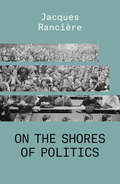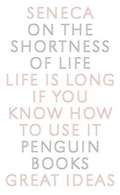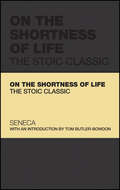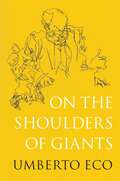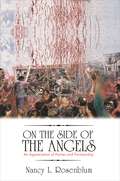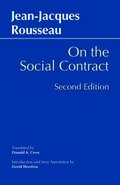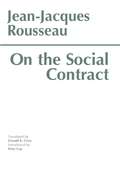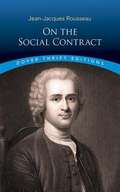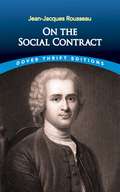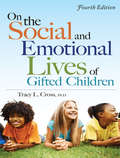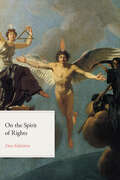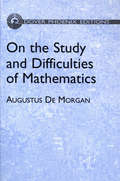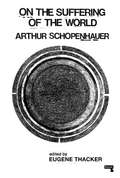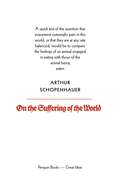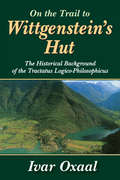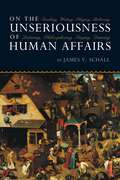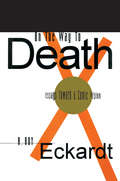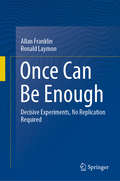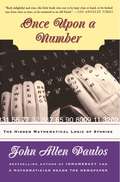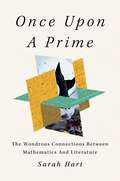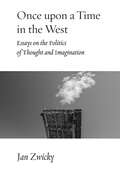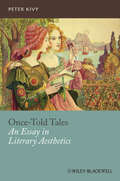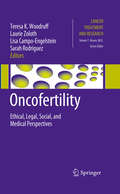- Table View
- List View
On the Shores of Politics
by Jacques RanciereIt is frequently said that we are living through the end of politics, the end of social upheavals, the end of utopian folly. Consensual realism is the order of the day. But political realists, remarks Jacques Ranciere, are always several steps behind reality, and the only thing which may come to an end with their dominance is democracy. &‘We could&’, he suggests, &‘merely smile at the duplicity of the conclusion/suppression of politics which is simultaneously a suppression/conclusion of philosophy.&’This is precisely the task which Ranciere undertakes in these subtle and perceptive essays. He argues persuasively that since Plato and Aristotle politics has always constructed itself as the art of ending politics, that realism is itself utopian, and that what has succeeded the polemical forms of class struggle is not the wisdom of a new millennium but the return of old fears, criminality and chaos. Whether he is discussing the confrontation between Mitterrand and Chirac, French working-class discourse after the 1830 revolution, or the ideology of recent student mobilizations, his aim is to restore philosophy to politics and give politics back its original and necessary meaning: the organization of dissent.
On the Shortness of Life
by Lucius Annaeus SenecaThroughout history, some books have changed the world. They have transformed the way we see ourselves--and each other. They have inspired debate, dissent, war and revolution. They have enlightened, outraged, provoked and comforted. They have enriched lives--and destroyed them. Now, Penguin brings you the works of the great thinkers, pioneers, radicals and visionaries whose ideas shook civilization, and helped make us who we are. Penguin's Great Ideas series features twelve groundbreaking works by some of history's most prodigious thinkers, and each volume is beautifully packaged with a unique type-drive design that highlights the bookmaker's art. Offering great literature in great packages at great prices, this series is ideal for those readers who want to explore and savor the Great Ideas that have shaped the world. The Stoic writings of the philosopher Seneca offer powerful insights into the art of living, the importance of reason and morality, and continue to provide profound guidance to many through their eloquence, lucidity and timeless wisdom. .
On the Shortness of Life: Life Is Long if You Know How to Use It
by Seneca C. D. CostaThroughout history, some books have changed the world. They have transformed the way we see ourselves—and each other. They have inspired debate, dissent, war and revolution. They have enlightened, outraged, provoked and comforted. They have enriched lives—and destroyed them. Now, Penguin brings you the works of the great thinkers, pioneers, radicals and visionaries whose ideas shook civilization, and helped make us who we are. Penguin's Great Ideas series features twelve groundbreaking works by some of history's most prodigious thinkers, and each volume is beautifully packaged with a unique type-drive design that highlights the bookmaker's art. Offering great literature in great packages at great prices, this series is ideal for those readers who want to explore and savor the Great Ideas that have shaped the world.The Stoic writings of the philosopher Seneca, who lived from c. 5 BC to AD 65, offer powerful insights into the art of living, the importance of reason and morality, and continue to provide profound guidance to many through their eloquence, lucidity and timeless wisdom. This selection of Seneca's orks was taken from the Penguin Classics edition of Dialogues and Letters, translated by C.D.N. Costa, and includes the essays On the Shortness of Life, Consolation to Helvia, and On Tranquility of Mind. From the Trade Paperback edition.
On the Shortness of Life: The Stoic Classic (Capstone Classics)
by Lucius Annaeus Seneca Tom Butler-BowdonMake each of your days meaningful using Seneca's immortal guidance In On the Shortness of Life: The Stoic Classic, Tom Butler-Bowdon introduces the work of Lucius Annaeus Seneca, an ancient Roman philosopher who wrote on the fleeting nature of existence and the need to live in a way that is worthy of the short time we have on this planet. In the book, you'll learn how to go beyond busyness and shallow pursuits and fill your days with purpose. The happy life is the virtuous life. Seneca explains how to: Spend time in reflection and truly honour yourself and your value. Fulfil your duties to family and society yet remain mentally independent. Separate what matters from what merely pleases the ego. Perfect for anyone seeking meaning and purpose in their daily lives, On the Shortness of Life is an extraordinary reminder of the transient nature of life that shows you how to make each moment count.
On the Shoulders of Giants
by Umberto EcoOn the Shoulders of Giants collects previously unpublished essays from the last fifteen years of Umberto Eco’s life. With humor and erudition, one of the great contemporary thinkers takes on the roots of Western culture, the origin of language, the nature of beauty and ugliness, the imperfections of art, and the lure of mysteries.
On the Side of the Angels: An Appreciation of Parties and Partisanship
by Nancy L. RosenblumPolitical parties are the defining institutions of representative democracy and the darlings of political science. Their governing and electoral functions are among the chief concerns of the field. Yet most political theorists--including democratic theorists--ignore or disparage parties as grubby arenas of ambition, obstacles to meaningful political participation and deliberation. On the Side of the Angels is a vigorous defense of the virtues of parties and partisanship, and their worth as a subject for political theory. Nancy Rosenblum's account moves between political theory and political science, and she uses resources from both fields to outline an appreciation of parties and the moral distinctiveness of partisanship. She draws from the history of political thought and identifies the main lines of opposition to parties, as well as the rare but significant moments of appreciation. Rosenblum then sets forth her own theoretical appreciation of parties and partisanship. She discusses the achievement of parties in regulating rivalries, channeling political energies, and creating the lines of division that make pluralist politics meaningful. She defends "partisan" as a political identity over the much-vaunted status of "independent," and she considers where contemporary democracies should draw the line in banning parties. On the Side of the Angels offers an ethics of partisanship that speaks to questions of centrism, extremism, and polarization in American party politics. By rescuing parties from their status as orphans of political philosophy, Rosenblum fills a significant void in political and democratic theory.
On the Social Contract
by Jean-Jacques Rousseau David WoottonThis new edition features a revision by Donald A. Cress of his bestselling 1987 translation of On the Social Contract together with Introduction, footnotes, and chronology by David Wootton, one of our leading historians of the Enlightenment.
On the Social Contract
by Jean-Jacques Rousseau Donald A. CressContents include a note on the translation, introduction by Peter Gay, and a bibliography.
On the Social Contract
by Jean-Jacques Rousseau G. D. H. ColeRousseau seeks to explain why, when freedom is the natural state of human beings, they are not in fact free, and to establish the basis for legitimacy in a political community.
On the Social Contract: With Geneva Manuscript And Political Economy (Dover Thrift Editions Ser.)
by Jean-Jacques Rousseau"Man was born free, but everywhere he is in chains." Thus begins Rousseau's influential 1762 work, in which he argues that all government is fundamentally flawed and that modern society is based on a system of inequality. The philosopher posits that a good government can justify its need for individual compromises and that promoting social settings in which people transcend their immediate appetites and desires leads to the development of self-governing, self-disciplined beings. A milestone of political science, these essays are essential reading for students of history, philosophy, and other social sciences. G. D. H. Cole translation.
On the Social and Emotional Lives of Gifted Children
by Tracy L. CrossRaising happy, successful children is a goal of every parent of gifted children. In On the Social and Emotional Lives of Gifted Children, the nation's leading authority on the psychology of gifted children offers advice and encouragement for both parents and teachers. In a thoughtful, conversational style, the author offers an in-depth look at the complex social and emotional issues faced by gifted children. This revised and updated fourth edition of the popular text contains more than 10 new chapters, featuring contributions by scholars on gifted children's development from across the nation. On the Social and Emotional Lives of Gifted Children tackles important and timely issues dealing with the social and emotional needs of today's gifted children, including who gifted children are and what giftedness means; how parents, teachers, and counselors can guide gifted children; the issues facing gifted students in the 21st century such as technology and terrorism; and how the education of gifted children can adapt for the future. This concise, sensitive look at gifted children and their social and emotional world offers unique insights for both teachers and parents who support these special children.
On the Spirit of Rights (The Life of Ideas)
by Dan EdelsteinBy the end of the eighteenth century, politicians in America and France were invoking the natural rights of man to wrest sovereignty away from kings and lay down universal basic entitlements. Exactly how and when did “rights” come to justify such measures? In On the Spirit of Rights, Dan Edelstein answers this question by examining the complex genealogy of the rights that regimes enshrined in the American and French Revolutions. With a lively attention to detail, he surveys a sprawling series of debates among rulers, jurists, philosophers, political reformers, writers, and others who were all engaged in laying the groundwork for our contemporary systems of constitutional governance. Every seemingly new claim about rights turns out to be a variation on a theme, as late medieval notions were subtly repeated and refined to yield the talk of “rights” we recognize today. From the Wars of Religion to the French Declaration of the Rights of Man and of the Citizen to the 1948 Universal Declaration of Human Rights, On the Spirit of Rights is a sweeping tour through centuries of European intellectual history and an essential guide to our ways of thinking about human rights today.
On the Study and Difficulties of Mathematics
by Augustus De MorganOne of the twentieth century's most eminent mathematical writers, Augustus De Morgan enriched his expositions with insights from history and psychology. On the Study and Difficulties of Mathematics represents some of his best work, containing points usually overlooked by elementary treatises, and written in a fresh and natural tone that provides a refreshing contrast to the mechanical character of common textbooks.Presuming only a knowledge of the rules of algebra and Euclidean theorems, De Morgan begins with some introductory remarks on the nature and objects of mathematics. He discusses the concept of arithmetical notion and its elementary rules, including arithmetical reactions and decimal fractions. Moving on to algebra, he reviews the elementary principles, examines equations of the first and second degree, and surveys roots and logarithms. De Morgan's book concludes with an exploration of geometrical reasoning that encompasses the formulation and use of axioms, the role of proportion, and the application of algebra to the measurement of lines, angles, the proportion of figures, and surfaces.
On the Suffering of the World (Penguin Great Ideas Ser. #Vol. 14)
by Arthur SchopenhauerOn the Suffering of the World is a collection of the later aphoristic writings of Arthur Schopenhauer, known for their incisive, aphoristic style and dark, pessimistic view of human existence.Edited and with an introduction by Eugene Thacker, On the Suffering of the World comprises a core selection of Schopenhauer's later writings, gathered together for the first time in print. These texts, produced during the last decades of Schopenhauer's long life, reveal a unique kind of philosophy, expressed in a singular style. Eschewing the tradition of dry, totalizing, academic philosophy prevalent during the time, Schopenhauer's later writings mark a shift towards a philosophy of aphorisms, fragments, anecdotes and observations, written in a literary style that is by turns antagonistic, resigned, confessional, and filled with all the fragile contours of an intellectual memoir. Here Schopenhauer allows himself to pose challenging questions regarding the fate of the human species, the role of suffering in the world, and the rift between self and world that increasingly has come to define human existence, to this day. It is these writings of Schopenhauer that later generations of artists, poets, musicians, and philosophers would identify as exemplifying the pessimism of their era, and perhaps of our own as well. On the Suffering of the World is presented with an introduction that places Schopenhauer's thought in its intellectual context, while also connecting it to contemporary concerns over climate change, the anthropocene, and the spectre of human extinction. The book also includes a bibliography and chronology of Schopenhauer's life.
On the Suffering of the World (Penguin Great Ideas)
by Arthur SchopenhauerThroughout history, some books have changed the world. They have transformed the way we see ourselves - and each other. They have inspired debate, dissent, war and revolution. They have enlightened, outraged, provoked and comforted. They have enriched lives - and destroyed them. Now Penguin brings you the works of the great thinkers, pioneers, radicals and visionaries whose ideas shook civilization, and helped make us who we are.
On the Trail to Wittgenstein's Hut: The Historical Background of the Tractatus Logico-philosphicus
by Ivar OxaalOne of the most influential philosophers of the twentieth century, Ludwig Wittgenstein, and the roots of his monumental Tractatus are explored in this imaginative work. Oxaal picks up on themes developed in an earlier work of his on Jews, Anti-Semitism and Culture in Vienna, adding to it special issues concerning Wittgenstein's experiences in Norway in 1913-14, where he worked on ideas that were completed during the war. Oxaal situates the great philosopher in time, place, and attitude, showing how his personal background came to bear on the writing of the Tractatus. Wittengenstein has often been criticized for traces of solipsism and even mysticism, and Oxaal also examines these issues in a volume that integrates ethnography, nationality, and cultural studies. Oxaal sheds new light on the theme of Wittgenstein's Jewishness, and develops a new appreciation of the Wittgenstein family and Wittgenstein's better-known years in Vienna. The author is unsparing in his observations about racism and pessimism in Berlin and Great Britian during the period in which Wittgenstein worked and studied at Cambridge. The writing of the Tractatus spanned the First World War. In the period immediately after its completion, Wittgenstein found himself in The Hague where he was in discussions and disputes with Bertrand Russell. Oxaal covers these problems sensitively and with an appreciation of ambiguities in the life of a great philosopher and the confusions caused by a post-war change in fortunes--personal and familial. This work of an eminent social scientist and historian may not be the final statement on Wittgenstein, but it most certainly must be considered in any serious assessments of an iconic figure of the twentieth century.
On the Unseriousness of Human Affairs: Teaching, Writing, Playing, Believing, Lecturing, Philosophizing, Singing, Dancing
by James V. SchallIn this wise and witty book, acclaimed author James Schall illuminates a fundamental truth that will shock ceaselessly busy and ambitious Americans: human affairs are unserious. Following Plato, Schall shows why singing, dancing, playing, contemplating, and other "useless" human activities are not merely forms of escape but also indications of the freedom in and for which men and women were created. The joy that accompanies leisure, festivity, and conviviality, he demonstrates, gives us a glimpse of the eternal. On the Unseriousness of Human Affairs offers a vital message that is truly countercultural.
On the Wandering Paths (Univocal)
by Sylvain TessonA walking journey through France&’s vast interior becomes a meditation on both personal recovery and the role of history in the present—more than 425,000 copies sold in France After a free-climbing accident lands him in a coma and a hospital for four months, the French writer Sylvain Tesson makes a promise to himself: if he&’s ever able to walk again, he will traverse the entire country of France on foot. Part literary adventure, part philosophical reflection on our contemporary consumer culture, On the Wandering Paths takes us deep into the heart of what Tesson terms France&’s &“hyperrural&” zones. Tracing the obscure paths peasants once followed throughout the countryside, Tesson embarks on a three-month journey of solitude and personal contemplation as he walks along vast stretches of mountain ranges and rivers, encountering ancient Roman stone bridges and walkways, the French Foreign Legion, pagan prayer sites, Provençal villages, and the majestic Mont-Saint-Michel. Connecting deeply with the places he visits, his experiences inspire reflection on the essential need to disengage from the digital and immerse oneself in natural beauty.Rich with humor, historical insight, and literary power, On the Wandering Paths is both a meditation on the act of recovery and a potent recognition of the traces of our past in the present. Asking us to reassess our values and our relationship to the land, Tesson&’s exquisite chronicle through landscapes that continue to resist urbanization and technology is a thoughtful—and thought-provoking—glimpse into a poet&’s adventurous life. Les Chemins de Pierre, a film based on the book starring Jean Dujardin, is due to release in 2022.
On the Way to Death: Essays Toward a Comic Vision
by A. Roy EckardtOn the Way to Death completes Eckardt's astonishing trilogy on the interrelationship of comedy, death, and God. It addresses itself to the question of death as the basic incongruity of life. Here is opened to human view the final divine comedy: a total reversal of the traditional roles assigned to God and humankind, a comical denouncement of the terror of death. On the Way to Death follows Sitting in the Earth and Laughing and How to Tell God From the Devil to complete Roy Eckardt's trilogy on comedy, the devil, and God.
Once Can Be Enough: Decisive Experiments, No Replication Required
by Allan Franklin Ronald LaymonThere has recently been considerable discussion of a “replication crisis” in some areas of science. In this book, the authors argue that replication is not a necessary criterion for the validation of a scientific experiment. Five episodes from physics and genetics are used to substantiate this thesis: the Meselson-Stahl experiment on DNA replication, the discoveries of the positron and the omega minus hyperon, Mendel’s plant experiments, and the discovery of parity nonconservation. Two cases in which once wasn’t enough are also discussed, the nondiscovery of parity nonconservation and the search for magnetic monopoles. Reasons why once wasn’t enough are also discussed.
Once Upon a Number: The Hidden Mathematical Logic of Stories
by John Allen PaulosWhat two things could be more different than numbers and stories? Numbers are abstract, certain, and eternal, but to most of us somewhat dry and bloodless. Good stories are full of life: they engage our emotions and have subtlety and nuance, but they lack rigor and the truths they tell are elusive and subject to debate. As ways of understanding the world around us, numbers and stories seem almost completely incompatible. Once Upon a Number shows that stories and numbers aren’t as different as you might imagine, and in fact they have surprising and fascinating connections. The concepts of logic and probability both grew out of intuitive ideas about how certain situations would play out. Now, logicians are inventing ways to deal with real world situations by mathematical means--by acknowledging, for instance, that items that are mathematically interchangeable may not be interchangeable in a story. And complexity theory looks at both number strings and narrative strings in remarkably similar terms. Throughout, renowned author John Paulos mixes numbers and narratives in his own delightful style. Along with lucid accounts of cutting-edge information theory we get hilarious anecdotes and jokes; instructions for running a truly impressive pyramid scam; a freewheeling conversation between Groucho Marx and Bertrand Russell (while they’re stuck in an elevator together); explanations of why the statistical evidence against OJ Simpson was overwhelming beyond doubt and how the Unabomber’s thinking shows signs of mathematical training; and dozens of other treats. This is another winner from America’s favorite mathematician.
Once Upon a Prime: The Wondrous Connections Between Mathematics and Literature
by Sarah HartA New York Times Book Review Editors’ Choice “Wide-ranging and thoroughly winning.” —Jordan Ellenberg, The New York Times Book Review“An absolute joy to read!" —Steven Levitt, New York Times bestselling author of Freakonomics For fans of Seven Brief Lessons in Physics, an exploration of the many ways mathematics can transform our understanding of literature and vice versa, by the first woman to hold England's oldest mathematical chair.We often think of mathematics and literature as polar opposites. But what if, instead, they were fundamentally linked? In her clear, insightful, laugh-out-loud funny debut, Once Upon a Prime, Professor Sarah Hart shows us the myriad connections between math and literature, and how understanding those connections can enhance our enjoyment of both. Did you know, for instance, that Moby-Dick is full of sophisticated geometry? That James Joyce’s stream-of-consciousness novels are deliberately checkered with mathematical references? That George Eliot was obsessed with statistics? That Jurassic Park is undergirded by fractal patterns? That Sir Arthur Conan Doyle and Chimamanda Ngozi Adichie wrote mathematician characters? From sonnets to fairytales to experimental French literature, Professor Hart shows how math and literature are complementary parts of the same quest, to understand human life and our place in the universe. As the first woman to hold England’s oldest mathematical chair, Professor Hart is the ideal tour guide, taking us on an unforgettable journey through the books we thought we knew, revealing new layers of beauty and wonder. As she promises, you’re going to need a bigger bookcase.
Once upon a Time in the West: Essays on the Politics of Thought and Imagination
by Jan ZwickyWestern civilization is over. So begins Jan Zwicky’s trenchant exploration of the root of global cultural and ecological collapse: a way of thinking that is also linked to some of the West’s most noted achievements.The Renaissance merged imperial enterprise with Islamic algebra and recently recovered Greek mathematics to precipitate mechanized industry and resource extraction; these in turn made possible the growth of capitalism, the military-industrial complex, and Big Technology. Despite its self-image as objective, Zwicky argues, the West’s style of thought is not politically neutral, but intensely anthropocentric. It has led those who adopt it to regard the more-than-human world as nothing more than timber licences and drilling sites, where value is not recognized unless it is monetized. Oblivious to context and blind to big-picture thinking, it analyzes, mechanizes, digitizes, and systematizes, while rejecting empathy and compassion as distorting influences. Lyric comprehension, in Zwicky’s view, offers an alternative to this way of thinking, and she provides a wide range of examples. Once upon a Time in the West documents how a narrow epistemological style has left Western thought blind to critical features of reality, and how the terrifying consequences of that blinkered vision are now beginning to unfold.
Once-Told Tales
by Peter KivyDrawing comparisons with other art forms, this book examines the role of aesthetic features in silent reading, such as narrative structure, and the core experience of reading a novel as a story rather than a scholarly exercise. Focuses on the experience of the art form known as the novelUses the more common perspective of a reader who reads to be told a story, rather than for scholarly or critical analysisDraws comparisons with experience of the other arts, music in particularExplores the different effects of a range of narrative approaches
Oncofertility
by Lisa Campo-Engelstein Sarah Rodriguez Laurie Zoloth Teresa K. WoodruffOncofertility has emerged as a way to address potential lost or impaired fertility in cancer patients and survivors, with active biomedical research that is developing new ways to help these individuals preserve their ability to have biological children. In order to move beyond oncofertility as a science and medical technology and begin to address the ethical, legal, and social ramifications of this emerging field, we must give voice to scholars from the humanities and social sciences to engage in a multidisciplinary discussion. This book brings together a pool of experts from a variety of fields, including communication, economics, ethics, history, law, religion, and sociology, to examine the complex issues raised by recent developments in oncofertility and to offer advice from national and international perspectives as we create new technology. Given the inherent interdisciplinary nature of oncofertility, this book is not only valuable, but also necessary to cultivate a deep understanding of new issues with the eventual aim of offering proposals for addressing them. Indeed, this book will be useful for people not only within the humanities and social sciences disciplines but also for those who are confronted with cancer and the possibility of impaired fertility and the medical practitioners within oncology and reproductive medicine who are at the front lines of this emerging field.
